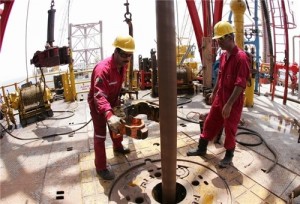 Iran�will offer foreign partners incentives to find and pump more crude and natural gas and will pay some fees in barrels as it seeks to boost income once international sanctions are lifted.
Iran�will offer foreign partners incentives to find and pump more crude and natural gas and will pay some fees in barrels as it seeks to boost income once international sanctions are lifted.New contracts Iran is developing will offer higher fees for riskier exploration and production projects, oil-ministry officials said at a conference in Tehran yesterday. Local and international executives attended a two-day meeting to discuss rules that would govern oil and gas production if Western curbs on Iranian energy exports are removed. The committee revising the Islamic republic�s contract model presented terms called the �Iran Petroleum Contract.�
�We�ve analyzed all the contracts in the market right now, all available beneficial models, and this is what we�ve come up with,� Mehdi Hosseini, a government energy adviser who leads the ministry committee, said at the conference. �This is a good model, with flexibility.�
Iran, a member of the Organization of Petroleum Exporting Countries, is discussing limits to its nuclear program in exchange for the removal of Western sanctions on its financial and energy industries. It agreed with six world powers on Feb. 20 to start negotiations next month that may achieve a long-term nuclear accord before a six-month interim deal expires. The U.S. and its allies believe Iran may be seeking to develop atomic-weapons technology, a claim that Iran denies.
Boosting Output
Raising production is �our major responsibility,� Oil Minister Bijan Namdar Zanganeh said at the conference.
U.S. crude for April delivery rose as much as 0.7 percent today, with West Texas Intermediate futures trading at $102.27 a barrel at 9:21 a.m. in�New York.
�There�s a large potential for really increasing production,� Simon Wardell, a director at consultants IHS CERA in�London, said by telephone today. Iran is �keen to offer some kind of reasonable terms for new exploration projects. That may even provoke more competition in the region, though we are still a long way off from that.�
The country probably wouldn�t be able to complete any new oil-investment contracts until at least the middle of 2015, given the minimum time needed for the two sides to conclude nuclear talks and for the U.S. and its allies to potentially lift sanctions, Wardell said.
Proposed Terms
Under the proposed terms, state-run National Iranian Oil Co. will form joint ventures for crude and gas production with international companies to manage projects, provide financing and maximize hydrocarbon recovery, Hosseini said. Partners conducting exploration projects will be paid for their work with a share of the output, according to presentations at the conference.
�Ownership of the reservoirs belongs to the people, so ownership is never possible to be transferred,� Hosseini said. �The ownership of the produced oil can be negotiated.�
International companies seek access to hydrocarbons to book reserves, a form of reporting by which they can claim a share of oil and show they can replace barrels they produce. Under the new contract model, Iran refers to this as �supplementary reporting,� said Ali Kardor, head of finance at NIOC, as the state firm is known.
Production Targets
The companies, which would have no rights over the reserves, would be able to report output they receive as payment once a field reaches its production targets and after exploration is complete, he said.
Russia�s�OAO Gazprom (GAZP), China National Petroleum Corp. and�Malaysia�s Petroliam Nasional Bhd., or Petronas, were among a dozen foreign firms the organizers said attended the conference. Western European companies were not present.
International companies will act as the sole operator at oil and gas exploration blocks and will be responsible for the risks of those projects. NIOC may be a technical partner in the developments. The ventures will have 15 to 20 years to pump oil after seven to nine years of exploration under the new contracts, Hosseini said.
Fees paid to international companies will be linked to the oil price and determined on a sliding scale, with riskier developments paying more, Hosseini said. Iran is giving priority to investment in common fields shared with neighboring countries such as Iraq and Qatar, and work on those deposits will be remunerated at the higher rate.
Biggest Reserves
Future partners will be able to recover all development costs linked to exploration and the start of production. They will be offered exploration rights in nearby areas if they find no oil or gas in a block where they�ve been working.
The Middle East nation has the world�s largest gas reserves, estimated at 1,187 trillion cubic feet, and the fourth-biggest�oil deposits, at 157 billion barrels, according to BP Plc�s Statistical Review published in June 2013.
Sanctions have almost closed Iran�s oil and gas fields to investment over the last decade, limiting access to technology needed to boost output and build export plants for liquefied natural gas. The constraints have cut oil exports by about half, according to the�International Energy Agency.
By Bloomberg
The Iran Project is not responsible for the content of quoted articles.










